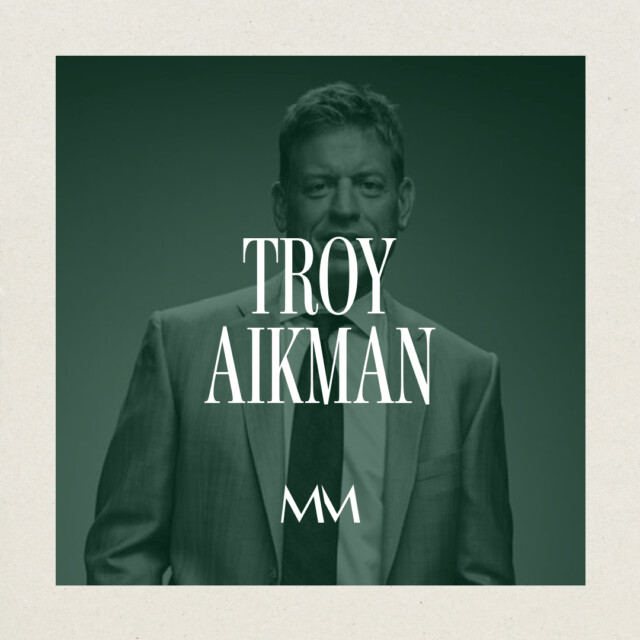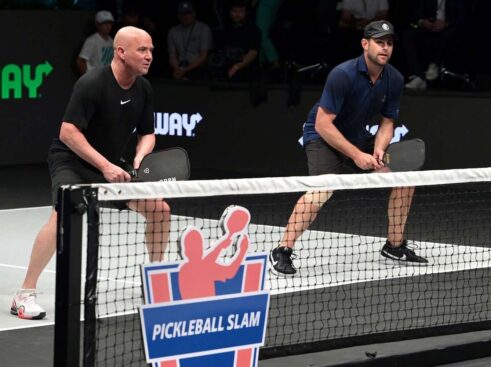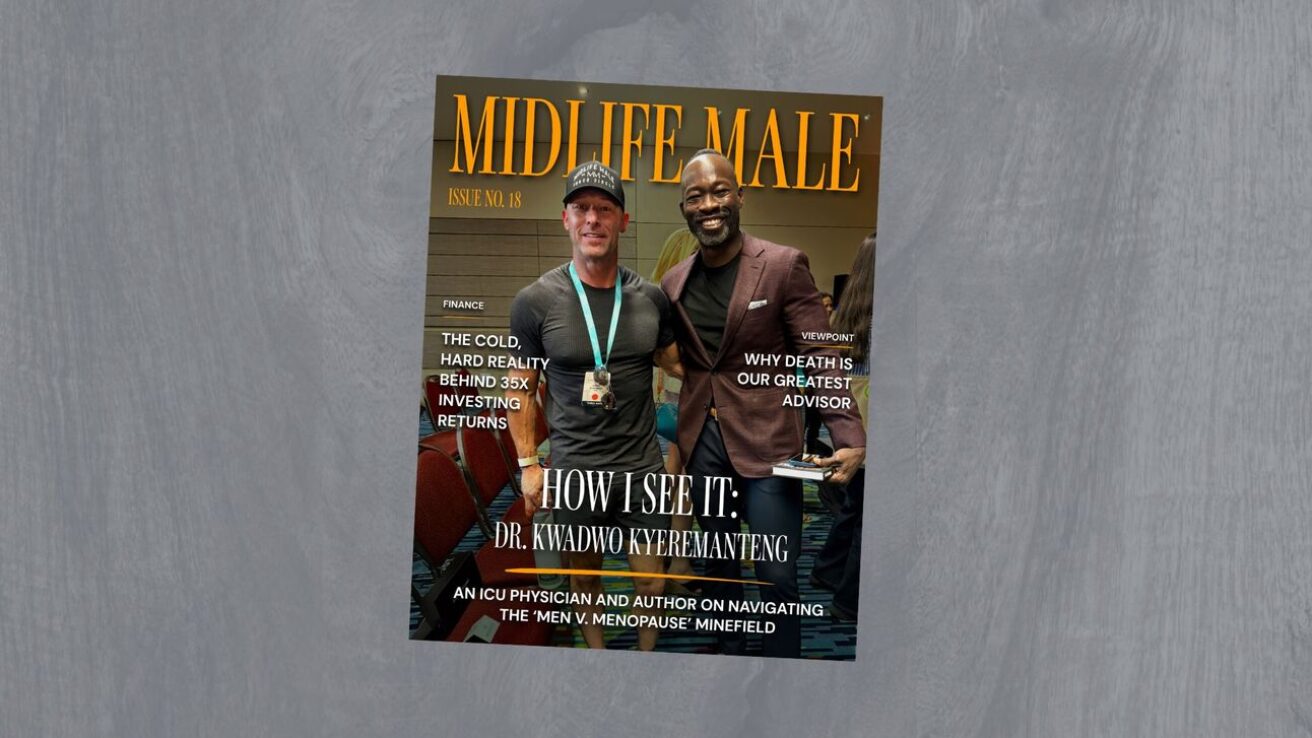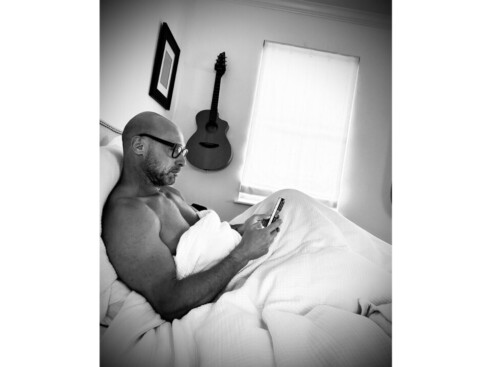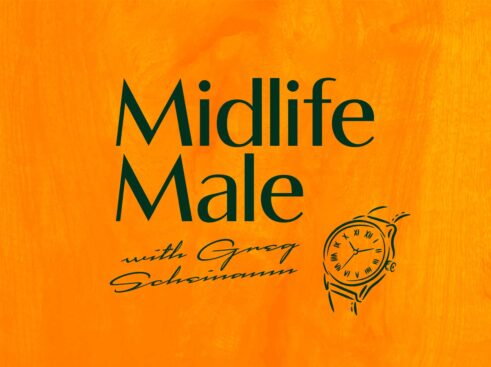Also, if you received last week’s issue, I hope you took the time to read this piece by our Editor-in-Chief, Jon Finkel, about giving his son’s 11-year-old flag football team a halftime speech that helped them win their Super Bowl. I have one son in college and another about to leave for school next year. This piece by Jon took me right back to some of the best times of my life: coaching my young kids and teaching them about fortitude, teamwork and tenacity. It gave me goosebumps because I remember how special it is. If you’ve coached your kids, you know. If you haven’t, volunteer tomorrow. It is one of the best decisions you’ll ever make and you’ll create memories that will last you forever. In fact, here is a photo of when I coached my son’s squad to the title over a decade ago:


‘How I See It’ With Dr. Kwadwo Kyeremanteng

I attended a conference recently and three out of the four panelists for a conversation about menopause from the male perspective were middle aged females. Doesn’t sound right, does it?
The audience was also 90% middle aged women, which begged the question: “What do they want to know about how MEN see menopause?”
While the female panelists were well-known figures in the menopause space, including Cynthia Thurlow and Jessica Shepherd, it was a lone male panelist, Dr. Kwadwo Kyeremanteng, who intrigued me the most and who I ultimately wanted to hear a lot more from.
Beyond Dr. Kyeremanteng’s professional credentials as an ER physician and author, here was someone who understood the complex dynamics of navigating midlife as a husband, father, and provider. His approach wasn’t just clinical—he lived this reality daily, both as a medical professional specializing in longevity and optimization, and as a man experiencing these challenges firsthand.
He’s also incredibly fit, impeccably dressed, and a successful entrepreneur beyond his medical practice.
The timing of talking with Dr. Kyeremanteng couldn’t have been more relevant for me. At almost 52 (next month), with my wife at 55 and in the thick of menopause, I’m literally in this phase of life where unintentional divergence in relationships happens (at least that’s what the statistics say).
While I’m dialing in my health optimization, supplementing with TRT, training daily and feeling like I’m just getting started, my wife, like many women, is wrestling with fluctuating sex drive, mood swings, and the complex journey of hormone balance. It can be a slippery slope when one partner is “dialing up” while the other might be “dialing down”— and can create distance that neither party intended (or wants).
What struck me about Dr. Kyeremanteng’s message was its departure from the typical narrative surrounding men and menopause. Too often, the conversation focuses solely on how men should support their partners: be more empathetic, more understanding, less demanding. While these are crucial aspects, they overlook a fundamental truth: men need advocacy too. We deserve space to address our own needs, emotions, and hormonal changes during this period. True partnership during menopause requires bilateral empathy and understanding.
I’m protective of men because, now more than ever, we get a bad rap. We’re underserved, underappreciated, and often overlooked in these conversations.
While there’s an abundance of support groups, books, and resources for women going through menopause—which is absolutely necessary and valuable—the message to men is typically one-dimensional: be more supportive. When people claim to discuss menopause from the male perspective, they’re usually still approaching it from a female viewpoint, simply telling men what they should and shouldn’t do for their partners.
Don’t misunderstand—I’m not suggesting we shouldn’t be supportive or empathetic. But men need advocacy too. We need to stand up for our needs, our feelings, our emotions, our hormones, and our own journey toward optimization, longevity, and fulfillment. Sexual satisfaction, happiness, and well-being shouldn’t be taboo topics for men during this phase of life. The empathy needs to flow in both directions.
That’s why it’s so important to have guys we can talk to.
After the panel, I seized the opportunity to speak with Dr. Kyeremanteng. We connected immediately over our shared perspectives on male wellness, leadership, and the importance of thriving through life’s transitions. Our impromptu conversation evolved into something more meaningful—a chance to explore menopause from a genuine male perspective, not just as supportive partners but as men navigating our own journey of growth and adaptation during this significant life phase.
This interview isn’t just about menopause—it’s about how men can maintain their vitality, purpose, and positive impact while supporting their partners through this challenging transition. It’s about creating a more nuanced dialogue that acknowledges both partners’ experiences and needs. Through Dr. Kyeremanteng’s insights and personal journey, we’ll explore how men can lead by example, prioritizing their own well-being while fostering stronger, more understanding relationships. Here is our conversation:
HOW I SEE IT w/ Dr. Kwadwo Kyeremanteng
MLM: Did you always want to be in medicine?
Dr. Kyeremanteng: Pretty early, pretty early on. I was a pretty sickly kid. I had pretty significant asthma that landed me in the hospital quite frequently, and I had this incredible pediatrician. His name was Dr. Conrad. You enter this state where you’re coming in here, and you can’t breathe, and you’re scared. Dr. Conrad would walk in, put his hand on your arm and hand on your chest, put his hand on my mom’s shoulder, and be like, “It’s going to be okay.” And that feeling when he walked in the room was everything.
MLM: And to you, that inspired the goal?
Dr. Kyeremanteng: Absolutely. I had the goal of wanting to bring that to people, wanting to serve in that way. I wasn’t sure exactly how that would land—I wasn’t sure if I was going to be a pediatrician myself—but that was the dream initially. Eventually, I worked my way into medical school and found my specialty after a bit of trial and error.
MLM: What is your specialty?
Dr. Kyeremanteng: I wear two hats. My real passion is in ICU. I’m an intensive care physician. I also run our department at The Ottawa Hospital. Before finding the ICU, I thought I maybe wanted to be a pediatrician, but it wasn’t the right environment for me. I considered surgery, but my hands weren’t the best, and the lifestyle was incredibly difficult.
MLM: So how did you land on ICU?
Dr. Kyeremanteng: I did this elective in intensive care in Calgary, and it was almost instantaneous. I walked into the ICU—some trauma patient needed a tracheostomy, someone was bleeding from their intestines and needed to be acutely resuscitated. We were working as a team, thinking creatively to solve all these issues, and I thought, This is my home. This is where I need to be. I fell in love with it. I knew at that point that this was what I wanted to do.
MLM: Did you make yourself more marketable as well?
Dr. Kyeremanteng: Yeah. Later on, I realized I needed to stand out, so I trained in palliative care as well. I really admired one of our palliative care physicians, Dr. John Seely. Similar to Dr. Conrad, he brought calm during really difficult times for families. I thought it would be a great complement to intensive care, especially since about 20% of our patients don’t survive.
MLM: How old are you?
Dr. Kyeremanteng: I’m 47.
MLM: Lifestyle-wise, you’re in amazing shape. As a husband, father, doctor, ICU specialist, author, and speaker, how do you manage it all? What’s your routine?

A Timeless Thanksgiving Message: Why Death is Our Greatest Advisor

Hope everyone had a happy & healthy Thanksgiving. I received this email the other day from a reader and thought it was timely to share with y’all:
“You have written about your father several times, and I know how important he was to you and how his early departure affected your life.
My father passed away two weeks ago, and we had his service today. He was a great father and taught me so much about people and hard work. All midlife males will face the burdens of caring for ailing parents and the emotional sadness of their actual passing. When I watched my father lie in bed for a week without eating or being able to communicate his feelings and shrivel up into a shell of his past, I saw death and life quite clearly.
Death is our greatest advisor, and I look at my years ahead with a certain urgency to get done what I can, while I still can, and prepare for the days when I can’t anymore. What I do today to take care of my body, my family, my finances, and my fun matters even more to me today after seeing the end so vividly.
Your work is a great reminder that this life isn’t a game that we can easily hit the replay button. It all matters, even the small stuff and I hope to tell my loved ones everything I need to say while I can still communicate with my heart.”
While loss is never a good thing, I was reminded of the long relationship these two men shared. My father and I didn’t have this chance, and I think about that often—what his life and my life would’ve been like had he lived past 47, an age that seems ridiculously young to me as I’m just a month away from turning 52.
It all moves fast. We have our oldest home from his junior year at college, and our youngest just got accepted to his first choice college (can’t reveal the university yet!). By next year, we’ll be empty nesters. So this is an especially poignant Thanksgiving.
To everyone out there: savor your moments. Hold your loved ones close. Time moves faster than we think, but love makes it all worthwhile.
Happy belated Thanksgiving,
Greg

Millions of stories are posted online every day and 99.9% are noise. We sifted through the nonsense to find experts and thought leaders who will share deep dives in one of our 6Fs every week: Fitness. Family. Finance. Food. Fashion. Fun. These are powerful essays by our team or guest writers designed to make you think, grow and maximize your midlife starting now.
FINANCE
The Cold, Hard Reality Behind 35x Investing Returns by Ron Speaker
What if I told you that one of history’s greatest bull markets in financial assets and real estate unfolded while we, midlife males, were growing up and grinding it out over the past 30 to 40 years? I use this measurement period because I didn’t start accumulating capital until the 1980s, when I bought my first stock, and real estate in the ’90s. Take a closer look at the two charts below on the S&P 500 and Colorado real estate prices to gain some perspective.

Anyone invested in these asset classes over the past 40 years has made money. Those who used leverage made a killing. Simply put, stocks have provided 35x returns (dividends reinvested), and real estate has yielded 8x returns. For the math nerds, that’s 3,500% and 800%, respectively. These are general market returns and don’t account for incredible individual stock picks (like AAPL, MSFT, NVDA, TSLA, etc.) or buying real estate in Aspen instead of Denver. Those choices could’ve added an extra digit to your net worth.
In hindsight, this looks like a generational opportunity to create family wealth. If we were lucky enough to be born in the ’60s or ’70s, we can thank declining interest rates, the sixth wave of innovation, deficit spending, and functional capital markets for much of this growth. But let’s take a deep breath and ask ourselves: What the F do we do now? How much risk should we take in the next decade of our financial lives?

Listen to the audio book of Midlife Male, read by author/founder Greg Scheinman, on Audible today!
For more midlife content in your feeds, follow our new Midlife Male channels on Instagram, YouTube, and Threads.
***
